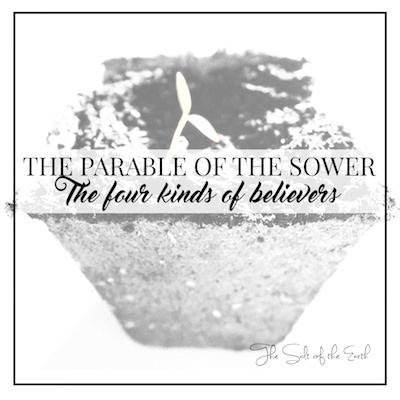Dina Lukas 16:19-32, urang maca pasemon ngeunaan lalaki beunghar jeung Lasarus. Tapi naha Yésus nyaritakeun misil ngeunaan jalma beunghar jeung Lasarus, naon anu Yesus coba ucapkeun?
Jesus taught the people in parables
Before Jesus told the parable of the rich man and Lazarus, Jesus had already spoken several parables to His disciples and the multitude. These parables were (among others) about the heart of the Father, the lost sheep, éta love of money, and that you can’t serve two masters; God and the mammon (kabeungharan).
The Pharisees, who were lovers of money (covetous), also heard the teachings of Jesus.
After hearing the parable of the unjust steward, the Pharisees derided Jesus (turned up the nose and made a hook of it on which to suspend Him as an object of ridicule).
But Jesus was not intimidated by them and didn’t let it get to Him.
Instead of withdrawing Himself and being silent, Jesus confronted the Pharisees with the fact, that they justified themselves before men, but God knew their heart and what is highly esteemed among men is abomination in the sight of God.
Jesus continued by saying, that the Law and the prophets were until John the Baptist. From that time the Kingdom of God is preached, and every man presses into it.
Sanajan kitu, the moral commandments of God of the Law still apply in His Kingdom.
The moral laws of the Law still apply in the Kingdom of God?
Jesus addressed the law of adultery which was part of the Law of Moses but also applicable in the Kingdom of God.
ceuk Yesus, that whosoever divorces his wife and marries another commits adultery. And whosoever marries her that is put away from her husband commits adultery.
This spiritual law was made visible in the natural realm through the Law of Moses. But it originates from the Kingdom of God and therefore still applies.
After these words, Jesus told the parable of the rich man and Lazarus.
What is the parable of the rich man and Lazarus?
In the parable of the rich man and Lazarus, Jesus spoke about a certain rich man, who was clothed in purple and fine linen. This rich man lived in luxury every day.
There was also a certain beggar, whose name was Lazarus. Lazarus laid at his gate and was full of sores.
Lazarus desired to be fed with the crumbs which fell from the rich man’s table. But instead of eating the crumbs that fell from the rich man’s table, the dogs came and licked his sores.
The rich man had everything his heart desired and filled himself with the riches and abundance of the world. Sanajan kitu, Lazarus suffered and didn’t receive what he desired.
Until the time for the rich man and the poor Lazarus arrived to leave this earth and the tide turned for both of them and their roles reversed
Through dead, the tide turned for the rich man and Lazarus and their roles reversed
Lazarus died and was carried by the angels into Abraham’s bosom. The rich man also died and was buried. However the rich man was not carried by the angels into Abraham’s bosom like Lazarus, but the rich man opened his eyes in hell.
The rich man lifted up his eyes in hell, being in torment, and saw Abraham afar off and Lazarus in his bosom.
The rich man cried and said, Father Abraham, have mercy on me, and send Lazarus, that he may dip the tip of his finger in water, and cool my tongue, for I am tormented in this flame.
But Abraham said, Son, remember that in your lifetime you received your good things, and likewise Lazarus evil things. Now Lazarus is comforted and you are tormented. And beside all this, between us and you there is a great gulf fixed, so that they which would pass from hence to you can’t, and neither can they pass to us that would come from thence.
The rich man prayed to send Lazarus to his brothers to warn them of hell
Since Lazarus could not come to the rich man, the man prayed father Abraham that he would send Lazarus to his father’s house to testify and warn his five brethren, so that they would not end up in the same place of torment.
But that wasn’t possible either. Abraham told the rich man that they had Moses and the prophets and that they had to hear them.
The rich man said, No father Abraham, but if someone went from the dead they will repent.
Abraham said, that if they would not hear Moses and the prophets, they would neither be persuaded if someone rose from the dead (Lukas 16:19-31).
What is the meaning of the parable of the rich man and Lazarus?
There are many things to say about this parable of the rich man and Lazarus, since you can view this parable from multiple perspectives. But the main meaning of the parable of the rich man and Lazarus and what Jesus was trying to say was that God’s view and standards differ from man’s view and standards (the world’s view) and that it’s about obedience to God.
God sees not as man sees. Man looks on the outward appearance but God looks on the heart and wants obedience to Him. What is highly esteemed among men is abomination in the sight of God (1 Samuel 16:7).
The rich man was selfish and didn’t care for Lazarus
But whoso hath this world’s good and sees his brother have need, and shutteth up his bowels of compassion from him, how dwells the love of God in him? (1 John 3:17)
In the parable of the rich man and Lazarus, Jesus compared the Pharisees with the rich man. The rich man was wealthy and had a great life, but he didn’t hear and keep the Law and the prophets and didn’t do the will of God.
He was selfish and kept all that he had for himself and didn’t care for the poor.
The rich man didn’t care for the poor Lazarus, who laid at his gate and needed what he had. But he walked by him without giving what he needed, while he was able to.
Although the rich man was a son of Abraham and was born in the covenant, he didn’t live in obedience to the Law and the prophets, but rejected them. Just like the Pharisees, who despite their position and knowledge of the Scriptures and the preaching of the Law and the prophets, they didn’t live according to the Law and the prophets.
The Pharisees knew the scriptures but didn’t live in obedience to God’s will
The Pharisees were prideful, covetous (loves of money), and lived according to their own carnal will, nafsu, jeung kahayang. They didn’t love God with all their hearts. Therefore their hearts didn’t go out to God and do His will and take care of God’s flock and nurture the sheep.
They didn’t care for the poor and widows, but they ate the houses of the widows (Mateus 23:14, Tandaan 12:40, Lukas 20:47).
The Pharisees were lovers of themselves, kakuatan (might), and money and kept all they had for themselves.
They were out for their own gain, to obtain a position of power and prestige among the people, and treated the flock as merchandise.
But although the people looked up to them and feared and admired them, God didn’t look up to them. Even though they belonged to the House of Israel and were positioned in the temple as leaders and teachers of His people.
God despised them, because they refused to submit to Him, obey His words, ngajaga parentah-Na, jeung ngalakukeun kahayang-Na.
They lived from their evil heart according to their own will, nafsu, and desires and persevered in sin and unrighteousness while pretending they were holy and righteous.
But God knew their hearts.
The people, who belong to God obey Him and do His will
The thoughts, words, and works of people originate from the heart. Therefore they testify to whom people belong.
When people belong to God and are born of Him, they shall have the mind of Christ and listen to Him, obey Him, do His works, and live according to His will in righteousness.
When people belong to the world, they shall have the mind of the world and listen to the words of the world and think, speak, and act like the world according to the will of (fallen) humanity and live in unrighteousness.
If the Pharisees were truly circumcised of heart and their hearts belonged to God, then they would have heard and obeyed the words of Moses and the prophets in their lives
If they had heard and obeyed the words of Moses and the prophets in their lives, they would have recognized John the Baptist as sent by God.
They would have listened to his words and given heed to his call of repentance and repented of their sins and be baptized in water.
They also would have recognized Jesus as the Son of God and the Messiah and would have listened to Him and believed and obeyed His words.
But the Pharisees didn’t.
The Pharisees were highly esteemed among the people, but in the eyes of God they were despicable
Although the Pharisees knew the Scriptures and preached the Law and the prophets, they didn’t live according to the Law and the prophets. The Pharisees rejected the words of God, which were spoken by Moses and the prophets.
Because they didn’t listen to the Law and the prophets, but rejected them, they also didn’t listen to Jesus, Who spoke the words of the Father and did His works, but rejected Him.
In their own eyes and the eyes of people, the Pharisees were righteous, important, powerful, rich in knowledge of the Scriptures, highly esteemed among men, and considered being sent by God. But in the eyes of God, the Pharisees were despicable and their destination would be the same as the rich man. (Baca ogé: The difference between Jesus and the religious leaders).
Obedience or disobedience to God determines the destination of people
In hell, the rich man found out that obedience or disobedience to the Law and the prophets, which represent the will of God, determines the destination of people.
Ku kituna, the rich man wanted to warn his brothers of hell. He wanted someone to tell them that they should listen to the words of the Law of the prophets and obey them. Jadina, their final destination would be different than the destination of their brother, who was tormented in the flame of fire.
But the prayers of the rich man to send Lazarus to cool his tongue with water and to send Lazarus to his brothers were not answered.
Jesus revealed the truth of God and the reality of hell
Through the parable of the rich man and Lazarus, Jesus revealed the truth of God about life, His will, His standards and judgment, life after death, and the reality of hell.
Jelema-jelema, who love God with all their heart, mind, soul, and strength, and submit to Him and obey His words and keep His commandments and live according to His will in righteousness, shall be with Him.
Tapi jelema, who love themselves and the riches and power of this world and live according to the will, nafsu, and desires of the flesh in sin and iniquity, shall go to hell.
You have a choice to believe the words of Jesus and obey God or reject His words and disobey God.
For the rich man, it was too late to repent and change his life. But if you read this it’s not too late for you to repent and change your life.
Your destination depends on the choice you make in this life on earth. Ku kituna, choose wisely.
'Janten uyah bumi’





